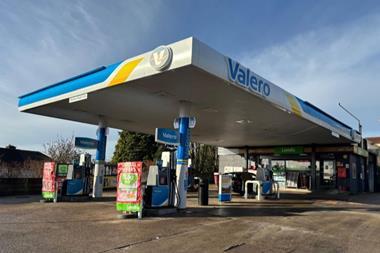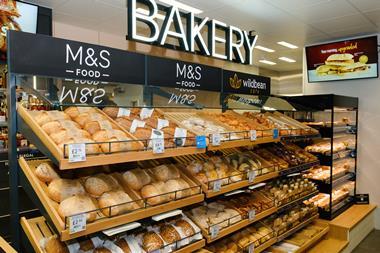Whether or not you’ve heard of the Sewell Group before, a few hours spent travelling around the city of Hull in a Porsche will ensure that you never forget it. The name is everywhere – on schools, buildings, promotional panels, and, more importantly, on some extremely smart forecourts.
Sadly the Porsche is not mine, but belongs to the managing director of the Sewell Group’s retail division, Patrick Sewell, who kindly took the trouble to drive me around the city, proudly and enthusiastically showing me the group’s six forecourt sites – it also has one standalone convenience store – and relating the plans, achievements and thoughts behind each one.
They all have a differing audience – from small town site to neighbourhood to motorway – and yet all bear the hallmarks of a company with high standards, which has pursued a programme of continual investment both in the forecourt, equipment and the staff. They are a reflection of the vision, energy and experience of the Sewell Group’s retail management team, which, apart from Patrick, includes the chairman Bob Craven-Jones – the former managing director of Burmah Petroleum – and his son David, who was an Esso sole trader for 12 years, previously operating three sites.
Back at the group’s modern headoffice and you begin to get a sense of the size of the company and its long and deep-rooted connection with the area. Plus the fact that for a construction company founded in 1878, the forecourt business, which it came into by accident rather than design in 1990, is a relatively new addition.
The Sewell Group plc is a £40million turnover operation, employing 250 people, and consists of four divisions – Developments, Facilities Management, Construction and Retail. It has a reputation for being a proactive and innovative organisation with accreditations such as ‘Outstanding Investor in People’, and ‘firsts’ in Public-Private Partnership/Private Finance Initiatives, such as the Victoria Dock Primary School, the first PFI School in the UK; and pioneering work with the NHS LIFT programme.
“The company has a high profile in the community, therefore we have certain standards to maintain,” says Patrick, whose father Paul is managing director of the group, and holds numerous positions in the community, such as Chamber of Commerce president, and so on.
“The retail side was always a fringe part of the business,” explains Patrick. “It emanated from the fact we had a stereotypical builders yard – which had cement, building materials, and office and joiners shop. On the side it had a petrol station – a small BP site – which we used mainly to service our own needs, although it did serve the public as well. When we relocated our headoffice we re-sited the petrol station onto the bypass that was being built at the time. Suddenly, instead of having a little shack that sold a few thousand litres of fuel a week, we ended up with – at the time – the biggest petrol station, the biggest shop and the only facility that was open for 24 hours in the whole of Hull.
“What happened at the time was that no-one knew anything about retail. I guess it wasn’t a very competitive market at the time, and there weren’t any supermarkets selling petrol. The site was managed predominantly by a construction manager. He used to pop in and make sure the supervisor had done the banking. It was just a matter of good housekeeping rather than any thought of a specialist retail outlet. At the time we had a tie-in with Costcutter. Looking at the difference between how the site looked then and how it looks now, it’s light years apart.”
With its first foray into petrol retailing having appeared relatively easily, the company bought another site in 1994. “It was an old petrol station and workshop with sheds at the rear,” says Patrick. “We knocked the whole place down, sold half the site off, and built our own petrol station. Then in 1995 we bought another site.
“The three sites were geographically very close – like a triangle – and were all supplied by Fina. It was the start of our ongoing relationship with the company, to where we are now with all our sites being supplied by Total.”
Following another two years consolidating the three sites, two more sites were acquired in 1997. The next venture was non-petrol. “We bought a newsagency and pretty poor convenience store in Swanland. We knocked them both down, started again and amalgamated all of it into one.
Then two years ago we bought two sites from Save. We decontaminated one and sold it off, but kept the other one – Ferriby – which is on the A63. It is the first site out of Hull and the road leads to everywhere. When we first took the site over it was doing 100,000 litres a week. It now does just under 300,000 litres a week, including huge amounts of HGV business – we have parking for 25 trucks. It is very much a site for transient trade and we plan to quadruple the shop and improve the site’s facilities to include toilets and showers. It has huge potential.”
From coming into the forecourt business through the back door, Sewells now has a very focused strategy which has seen the company thrive – total fuel volumes are 36m litres a year – while others have failed.
“There have been 27 sites closed in this area in the past four years” adds Patrick. “But the site closures have been a benefit to us. We’re now down to the hypermarkets and the good ones – about 55 sites.
“The reason for our success was that we became much better at what we were doing and how we fine-tuned our offering. We spend a lot of time benchmarking and looking at what other people do, pinching their ideas and amalgamating them into our business.
“We’re at the stage where we’ve done all the tangible, on-site physical things, and are now putting even more emphasis on the people. We’re very heavily staffed on the service stations and try to deliver good customer service and good presentation in all our stores.
“We want to expand – we’ve got a figure of 10 sites in our mind. We’re currently looking at lots of opportunities. Ideally we’d like them to all be Ferriby’s!”



























No comments yet